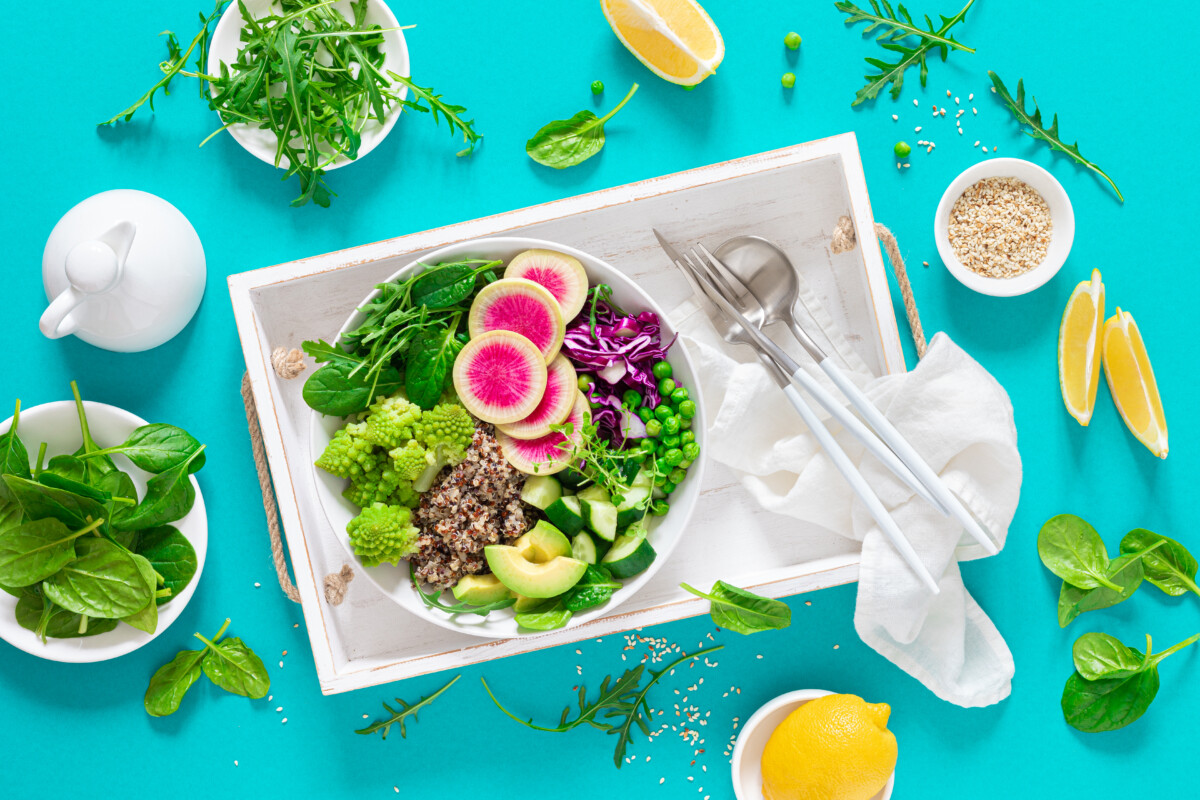Transitioning to a plant-based lifestyle as a family can be a rewarding and health-conscious decision. However, getting children, some adults, and especially fussy eaters, to embrace vegetables can sometimes pose a challenge. We spoke to certified nutrition coach & plant-based chef, Lisa Marley, and clinical psychotherapist & parenting educator, Jerilee Claydon, to get some practical tips and expert advice to help you encourage your family to eat more vegetables and foster a positive relationship with plant-based foods.

Certified nutrition coach & plant-based chef, Lisa Marley says: “Children, in particular, are more likely to adopt healthy eating habits if they see their parents/caregivers enjoying a variety of vegetables and plant-based meals. It’s important to make it a family affair by including vegetables in your meals and demonstrating your enthusiasm for plant-based foods.
“Create a positive association with vegetables by making them exciting and visually appealing. Engage family members in food shopping and let them choose their favourite vegetables. Experimenting with different cooking methods, such as roasting, grilling, or steaming, to enhance flavours and textures keeps things interesting for you and them. Additionally, involve the family in meal preparation to spark their creativity.”
Clinical psychotherapist & parenting educator, Jerilee Claydon advises, “When working with a picky eater, respect and educate, don’t enforce. Allow the child to feel in control and to build confidence, start with the things they like and gradually add to meals. Making a fruit smoothie with their favourite ingredients, allows them to add each ingredient themselves. Next time add a little extra. A tablespoon of chia seeds, or flax seeds. A ball of frozen spinach, something that won’t alter the taste but they know is in the smoothie so the fear around trying to things soothed.”
“Introducing a wide range of vegetables and plant-based meals gradually can help your family develop a taste for them. If the family is used to mainly meat-based dishes, start with adding side dishes, like carrots, bell peppers, or cucumbers before moving on to more intense flavours. Pair new vegetables with familiar foods or dips, such as hummus, to make them more appealing.”
Claydon advises, “Teaching children about the benefits of food and being specific, can encourage them to try new foods. For example:
- Cauliflower is good for your memory, it’ll help when you have your quiz at school or you need to recall where you put your toys!
- Blueberries help your brain make better decisions. – it improves cognition.
- Beetroot is great for your energy when you do sports.
- Brazil nuts are good for your mood as they are thought to generate happiness.
If something isn’t being enjoyed, find out what is exactly wrong. My kids were saying ‘Yuck’ to tofu. When they usually love it. What they didn’t like was the crispy tofu! They prefer the soft bake that hadn’t yet turned golden. Describing the texture to me was so helpful so the food could be modified rather than eliminated.”
Claydon says, “Planting tomatoes and watching them grow eliminates some of the unknown as the child has been invested in the process of growing it. An anxious child benefits from feeling in control, asking them to make a list of things they want to try and you also make a list then together choose something from each list.’
Marley added: “As a family, incorporating a range of colours on the plate will make the meal visually appealing but also provide an array of essential nutrients.
“Here are my top tips on how to become a plant-based family:
- Educate Yourself: Take the time to learn about plant-based nutrition, including the various sources of protein, iron, calcium, and other essential nutrients. This will help you ensure that your family’s dietary needs are met.
- Start Slowly: You can blend your current meat dishes with 50% lentils. Start with one to two days a week completely plant-based, and build on that.
- Plan Meals: Take some time each week to plan your meals and make. Make a shopping list.
- Experiment With Recipes: Explore plant-based recipes and experiment with different flavours and ingredients.
- Focus on Whole Foods: Emphasise whole, unprocessed foods in your family’s diet. These include fruits, vegetables, whole grains, legumes, nuts, and seeds.
- Be Mindful of Nutrients: Ensure that your family is getting all the necessary nutrients from their plant-based diet. Pay attention to sources of protein (such as tofu, tempeh, legumes, and quinoa), iron (including leafy greens, lentils, and fortified cereals), calcium (found in fortified plant-based milks, tofu, and leafy greens), and vitamin B12 (which may require supplementation).
- Connect: Try and meet with other plant-based families or individuals through local meetups, online forums, or social media groups. Sharing experiences and tips with like-minded people can provide valuable support and encouragement.
- Be Kind to Yourself: Remember that transitioning to a plant-based lifestyle is a process, and everyone’s journey will be unique.
- Transitioning is a Process: Transitioning to a plant-based lifestyle is a process, everyone’s journey will be unique. Be flexible and open to adjustments along the way. Don’t be too hard on yourself or your family if you occasionally enjoy non-plant-based foods—every small step towards a plant-based diet is a positive one.
- Be a Role Model: Be an example for your family by following a plant-based lifestyle yourself.”
About the experts
Jerilee Claydon is an accredited senior clinical psycotherapist, and doctorate researcher focusing on gentle parenting. She has trained as a newborn observation practitioner, and is a practitioner in the Gottman method of ‘bringing baby home’. Jerilee is also co-founder of the psychotherapy family therapy centre ‘Therapy Space’ in Hertfordshire, and is the creator of the online teacher training programme ‘PAUSE’ on how to run a therapeutic mother baby group. Follow her on Instagram @therapyproject

Lisa Marley is a plant-based chef, certified nutrition coach and television presenter who is ProVeg UK’s chef trainer. Lisa delivers face to face plant-based cooking training to local authorities and MAT caterers, as well as online plant-based training for schools.

Lisa trained as a pastry chef in London and brings a unique blend of influences that enable her to combine her ability to create mouthwatering recipes with a special focus to ensure that each dish she makes is not only nutritious, but also delicious. Follow her on Instagram @lisamarleychef


